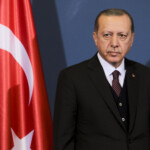“With less than two months until the elections, the AKP has no persuasive argument for why it should continue to govern. It seems that the ruling party has lost its psychological supremacy.”
This article was originally published by Diken News, and translated by FTP with the author’s permission.
Perhaps for the first time in its history, the AKP is running in an election where it is not considered the favorite. This is something new and unexpected, creating intense psychological pressure on the ruling party and its leadership. For a party that has won every general election for 21 years, the prospect of a defeat in the ballot box is a nightmare.
When the president announced the election date for May 14, the ruling party was confident it had the wind at its back. Conditions appeared conducive to winning. The so-called “Table of Six” (the opposition’s coalition bloc of six parties) had lost their earlier strong lead in the polls and were in disarray over naming as their joint presidential candidate. Meanwhile, people had come to learned to live with economic crisis, no longer shocked by rising commodity prices. The conditions seemed ripe for a victory for the ruling party.
Almost all surveys showed the AKP recovering since the summer, with many swing voters return to the ruling party. The ruling party needed to ride this wave of approval before the aftershocks of raising the minimum wage and social welfare spending hit voters.
The coming May 14 election date was the result.
However, events did not unfold as the AKP had calculated. The “ruling of the heavens,” as Erdogan called the February earthquake disaster (followed by flooding the next month) seemed not to favor the ruling party.
Meanwhile, the AKP’s jubilation over friction in the opposition block following disagreement about Kılıçdaroğlu’s candidacy was short-lived. The parties were reunited after a brief crisis, and the platform now carries two “star mayors” of the opposition into the presidential race: Ekrem İmamoğlu and Mansur Yavaş as vice-presidential candidates. The opposition bloc has overcome its nomination crisis by allowing all three possible candidates to take the field together.
The incorporation of Yavaş and İmamoğlu into the presidential team and their synergy with Kılıçdaroğlu and Akşener have consolidated opposition voters and stirred up hope. The wind has started to blow in favor of the opposition once again.
Earlier opposition emphasess on “the candidate who will win” have become an emphasis on a “winning team,” with the leaders of the Nation Alliance publicly aligned with the popular mayors of Istanbul and Ankara. As a result, the AKP’s plans to go to the elections with a wounded and divided opposition have came to naught.
The earthquake has also shattered the AKP’s calculations. Although contractors were immediately made “scapegoats” to deflect responsibility, the mistakes made after the earthquake have left the AKP vulnerable on the political stage.
It is impossible for an ordinary person not to establish a connection between the local government’s misconduct and the destruction and death in cities such as Maraş, Adıyaman, Malatya and Gaziantep – which the AKP have governed for years. Managerial shortcomings and cooperational failures in the aftermath of the earthquake have taken the wind out of the AKP’s sails.
Attempts at depoliticizing the disaster and silencing dissenting voices are unlikely to save the government from paying the political price for its insufficient support and general lack of efficiency in the earthquake zones.
Meanwhile, as elections loom on the horizon, the AKP is rushing to build a campaign around the theme of “rebuilding the regions destroyed by the earthquake.” The President’s visits to the region, tenders already awarded, and foundations already laid, confirm this intent.
The government wants to create a perception of “Yes, we can do it!” What they don’t realize is that they are instead creating the perception of responsibility. Every photo they pose for in an earthquake zone shows a country in ruins, where the AKP has been in power for 21 years. These photos destroy the claims of the ruling party, that Turkey is the rising star of the 21st century—which they proudly call the “Turkish Century”—and that the whole world is envious of Turkey’s achievements under AKP rule.
As part of its efforts to win the elections, the AKP is also frantically trying to expand its power bloc, the “People’s Alliance,” which includes six parties and may continue to grow. Even if it does, however, the bloc would be too crowded: diverse political parties with no common program, policies, or vision—but resolved to share the spoils if they win.
Furthermore, the pool of political parties available for alliance with the AKP has shrunk considerably in its 21 years in power. There is almost no political pact once established that has not ended up in a quarrel. The AKP is no longer a party that can form broad political alliances. It has lost its appeal to large segments of society—and especially the center.
This is why it seeks help from marginal parties. The ruling party’s attempt to persuade such parties as the Islamist, pro-Kurdish Hüda-Par and the New Welfare Party (Yeniden Refah Partisi) to join the “People’s Alliance” shows that the AKP’s options are extremely limited.
With Hüda-Par, the AKP is trying to reach out to the Kurds. This is a reasonable objective: almost half of the Kurdish population used to vote AKP but have left the party in recent years. The AKP’s alliance with the ultra-nationalist “National Movement Party” (MHP), coupled with its hard-line security policies in the region and, most recently, its economic crisis, have alienated Kurdish voters.
While the AKP maintains its alliance with the MHP and continues its militaristic approach to the Kurdish question, securing the support of Huda-Par is not likely to garner additional Kurdish votes. Huda-Par—with its radical Islamist political agenda and its past links with Turkish Hizbullah—is not an appropriate route to regain the Kurdish votes that the AKP has lost.
Hüda-Par does not represent ordinary ‘pious Kurds’, let alone the Kurdish electorate in general. With around 100 thousand votes in the region, Hüda-Par may be able to win the AKP an extra parliamentary seat, but it is also possible that such a marginal party will further alienate center-right Turkish voters in other parts of Turkey.
Bringing the New Welfare Party (Yeniden Refah) into the alliance is likely to have mixed results for the governing party. The YRP may add one or two percentage points to the People’s Alliance in the presidential election, but the party’s marginal demands—especially its conditions for abolishing some legal guarantees for women—are likely to alienate other voters.
Pious, educated, and urban women, who perhaps represent the most dynamic social group within the AKP, will not be willing to let their party take away their hard-earned rights. It is doubtful how wholeheartedly and actively these women (who have so far helped the AKP win several elections) will work for a party that is willing to acquiesce to the reactionary demands of the YRP.
In short, last month’s earthquakes shattered the slow and incremental progress that the AKP had made last summer. All post-quake polls show a decline in votes that signals the AKP’s loss in the upcoming elections. It will be difficult for the AKP to reverse this trend, not because it lacks the means to do so but because it does not have that much time. The opposition, meanwhile, have mended their differences and presented a united front to Turkish voters.
With less than two months until the elections, the AKP has no persuasive argument for why it should continue to govern. It seems that the ruling party has lost its psychological supremacy. The mental fatigue caused by 21 years in power seems to have bent the AKP’s backbone—and taken the wind out of its sails.


